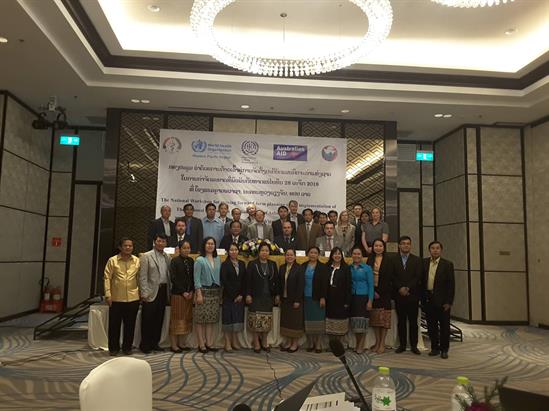
A National Action Plan to eliminate asbestos-related diseases in Lao PDR was launched at a multi-Ministerial workshop organised by the Ministry of Health and supported by the World Health Organization, Union Aid Abroad –APHEDA, the Australian government and the International Labour Organization. A key element in the plan which was approved and signed by the Minister of Health on 23rd November 2018 is to ban the importation and future use of chrysotile asbestos in Laos.
According to the International Labour Organization (ILO), Globally, 27% of all work-related deaths - around 742,000 deaths annually - are caused by cancer,)[1] Latest estimates released in November 2018[2] point to just one substance, asbestos, being responsible for 232,000, or almost one-third of that global total, mainly lung cancer, cancer of the lining of the lung as well as the larynx and ovary.
Strong support for the action plan to eliminate was received from participants at today’s launch including representatives from 9 Ministries, Lao Federation of Trade Unions, Cancer Centre of Mittaphap and Mahasot Hospitals and Health Science University and experts from Australia, Korea, Japan the WHO and ILO.
Minister of Health Assoc. Prof. Dr. Bounkong Syhavong stated before the workshop ‘I am pleased we now have the National Action Plan to eliminate asbestos related diseases in Laos which sets out a step by step plan to reduce asbestos use in Lao and then ban and then manage the asbestos remaining in the built environment’.
Dr Mark Jacobs, WHO Representative to Lao PDR said that “We congratulate the Ministry of Health and the other 9 Ministries for the hard work over the last 8 months to develop this very comprehensive roadmap to eliminating asbestos related diseases in Laos. This action plan builds on the experience of many other countries who have already banned this substance and serves as a model among ASEAN countries’ he said.
To date, 66 countries, including all member states of the European Union have banned the use of all forms of asbestos, including chrysotile. Other countries have introduced restrictions or no longer use it. Of great concern, some countries, such as Laos, have increased their production or use of chrysotile asbestos over the last decade.
Due to the long latency of asbestos-related diseases, the burden of these diseases continues to rise, even in countries that first started to ban the use of asbestos in the early 1960s. Banning now can will decrease the number of deaths in the future.
His Excellency Australian Ambassador to Laos Mr Jean-Bernard Carrasco said that “Australia is proud to have supported the development of the National Action Plan with the Ministry of Health through the work of Union Aid Abroad- APHEDA and in collaboration with WHO. We in Australia are paying a heavy health and economic price for our past use of asbestos.
“Currently Australia has one of the highest rates of asbestos-related disease in the world from its past use of this harmful substance.” said CEO of Australian Government’s Asbestos Safety and Eradication Agency.
‘Besides being contained in roof sheeting and other construction materials, it can also be found in some household goods, insulation and heat-resistance materials and in friction products such as brake pads and gaskets’
‘Given the current level of asbestos exposure among workers in roof sheet factories and communities living around those factories there is likely to be an increase in cancer rates in Laos in coming decades. She said.
Phillip Hazelton Coordinator for the Union Aid Abroad – APHEDA campaign to eliminate asbestos related diseases ‘Consumption of chrysotile asbestos has been very high in Laos in recent years, in fact per head the highest in the world, at 1.2 kgs/person, mostly due to roof sheet manufacture. The amount of imported asbestos reached over 8000 tons in recent years, according to information supplied in the National Action Plan launched today’ he said.
WHO recommends the most efficient way to eliminate asbestos-related diseases is to stop the use of all types of asbestos including chrysotile. Replacing asbestos with safer substitutes and developing economic and technological mechanisms to move to safer options will create new job opportunities.
Professor Ken Takahashi, WHO consultant and Director of the Asbestos Disease Research Institute in Sydney Australia, stressed that “Controlled use is not possible, we strongly support the Lao Government’s action plan and timetable for banning the use of chrysotile asbestos. He said –It’s also important to take preventive measures to minimise exposure during the transition period.” he added.
Dr Francisco Santos-O’Connor, the ILO Regional Senior Occupational Safety and Health Specialist, indicated that the ILO position on safety in the use of asbestos, which is governed by international legal instruments, calls for “the elimination of the future use of asbestos and the identification and proper management of asbestos currently in place as the most effective means to protect workers from asbestos exposure and to prevent future asbestos-related diseases and deaths.” Importantly, it also explicitly states: “the ILO Convention on Safety in the Use of Asbestos, No.162 should not be used to provide a justification for, or endorsement of, the continued use of asbestos.” The ILO concluded it welcomes this opportunity to work with the Government of Lao PDR, social partners and other parties to protect workers and prevent asbestos-related diseases.
__________________________________
[1] https://www.personneltoday.com/hr/the-worldwide-challenge-of-occupational-cancer/
[2] https://www.thelancet.com/journals/lancet/article/PIIS0140-6736(18)32225-6/fulltext
For Further information:
WHO
ILO
Phillip Hazelton Union aid Abroad APHEDA +84917878314
